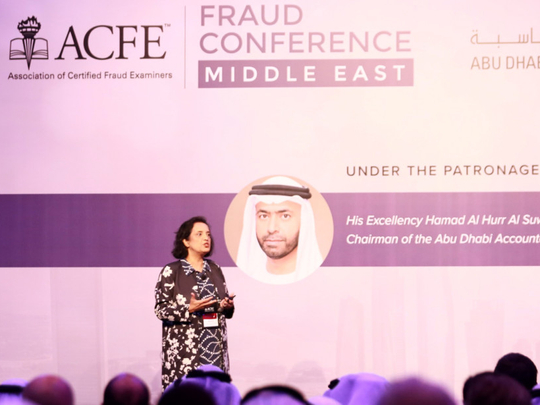
Abu Dhabi: During her good time in her Wall Street career, she had $100 million (Dh367 million) wealth but she felt it did not have the value of even a piece of paper when she was jailed for a financial crime, according to an American woman of Indian origin who warns others against committing fraud to make a fast buck.
Roomy Khan, who was a highly successful financial professional in the US, said a professional culture that encouraged bad behaviour also led to her downfall.
“Never estimate the power of culture … that is the biggest thing,” she said on Sunday at the 2018 ACFE Fraud Conference Middle East, hosted by the Abu Dhabi Accountability Authority (ADAA).
“The culture, in which I worked … everybody motivated and encouraged the bad behaviour.” [The ACFE is the Association of Certified Fraud Examiners.]
She was first caught by the Federal Bureau of Investigation (FBI) in 1999 for her misdeeds while working with Intel corporation during 1995-98 as she had shared confidential information to Raj Rajaratnam, an influential hedge fund manager who would be later arrested and jailed for 11 years for insider trading.
Insider trading is the illegal practice of trading on the stock exchange to one’s own advantage through having access to confidential information.
In 2001, she pleaded guilty to wire fraud, paid a quarter-million-dollar fine and the case was closed. Khan kept away from any illegal activity for the next four years.
But, she was lured by insider trading again in 2005 and caught by FBI again in 2007.
Khan said it was like a drug addict going back to drugs after rehabilitation.
If a rehabilitated person keeps the same company of drug addicts, he or she will go back to the habit again, she said.
Khan had to work as an agent for FBI for the next six years and after testifying at federal court, she spent a year in federal prison.
As a wealthy person, she had felt herself very powerful as she had access to powerful people. She was enjoying all luxuries in life with a huge house, many servants, luxury cars and branded goods etc.
She had earned millions from stock trading, using confidential information gained from her contacts in various companies.
But she and her family had to pay a heavy price for that. “I had a young daughter who was in middle school.” When she shared the information about her mother’s arrest with her friends, she was abandoned by her friends.
Her husband, too, faced problems at his work. “My picture was published in Indian newspapers.” That caused troubles to her old parents, family members and relatives.
“I still don’t want to google about myself. I don’t want to see my pictures [during her arrest and trial].”
Despite all these setbacks, Khan has transformed herself as a public speaker and corporate trainer who warns others about the risks of fraudulent activities. Now she is giving tips to others about how “bad choices can lead to really disastrous outcomes”, Khan said.
Best in Arab world, but UAE wants to improve transparency
Abu Dhabi: Although the UAE has been ranked the best in the Arab world in Transparency International’s (TI) annual Corruption Perceptions Index, the nation wants to improve further, a top official said here on Sunday.
Pointing out the impact of corruption, bribery and fraud on global economy, Al Suwaidi said the World Bank estimated the cost of bribes paid by businesses and individuals in 2017 at around $1.5 trillion (Dh5.51 trillion) or about 2 per cent of the global GDP, while the World Economic Forum put the figure at 5 per cent of the Global GDP or $2.6 trillion.
This has numerous effects on nations and societies, such as erosion of trust on governments, inefficient use of resources, increasing cost of public services etc, which lead to a fragile and weak society, he said. Environment is also hit hard, which affects the poor more and the whole population in the long run.
Established 20 years ago to encourage the adoption of ethical business practices and transparency within the public sector in the emirate, the ADAA is actively engaged with its partners in more than 300 public entities in promoting accountability and transparency, Al Suwaidi said.








